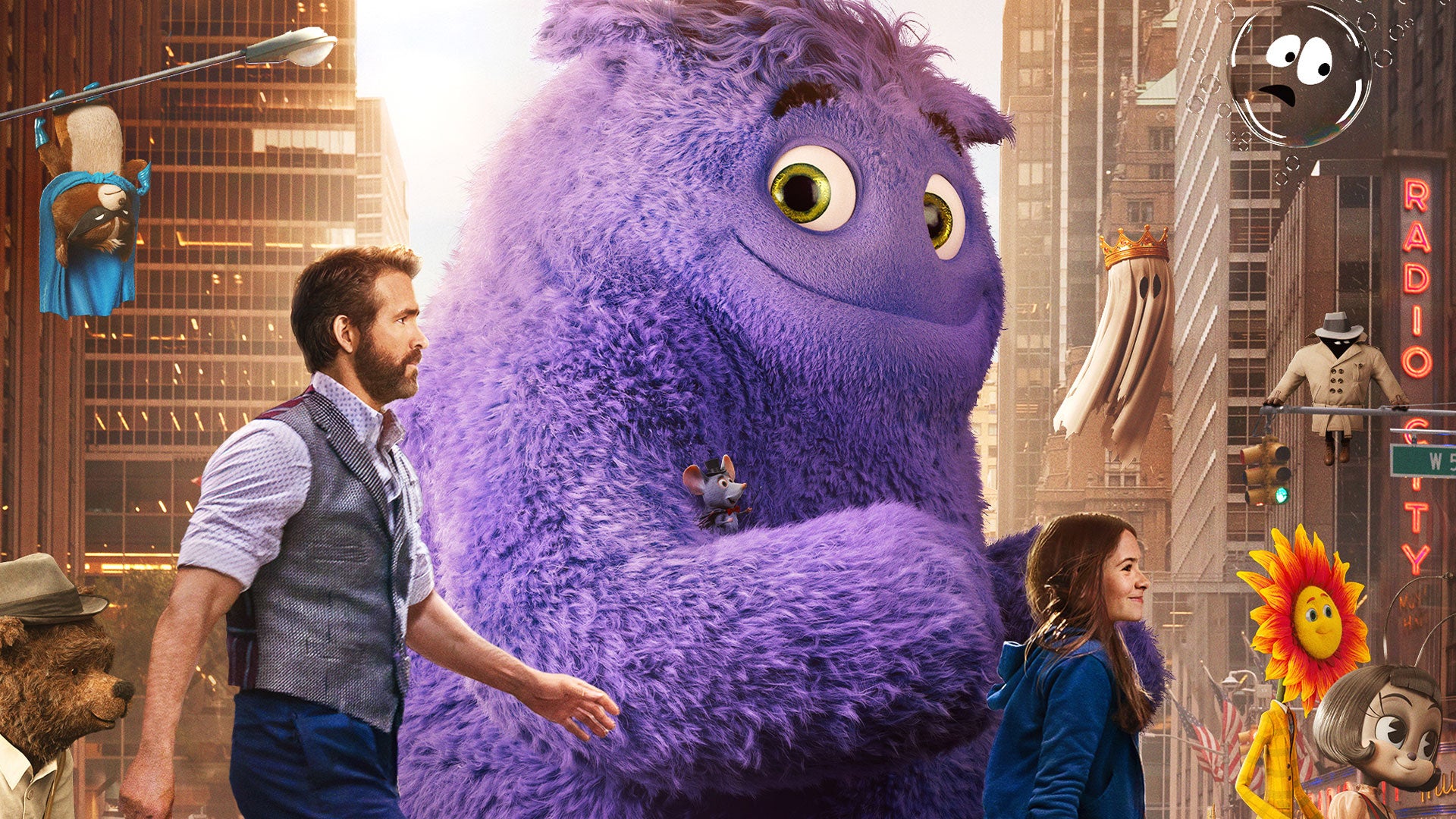When movies set out to extol the virtue of childhood imagination, they often end up revealing their lack of the same. Even Steven Spielberg, Hollywood’s eternal lost boy, isn’t immune to empty platitudes on the matter. (For proof, look no further than the lead-footed Peter Pan adaptation Hook or his saccharine Twilight Zone: The Movie installment, “Kick the Can.”) To the list of grownups flattening the adolescent experience into cliché, we must now add John Krasinski. IF, the one-time Office desk jockey’s latest venture behind the camera, is a cloying and oddly flat special-effects fable – a kind of bootleg Amblin Entertainment that never stops waxing rhapsodic about the beauty and creativity and magic of youth, even as it fails to capture much of that itself.
It’s Krasinski who does a lot of the waxing. Having previously played an emotionally constipated, necessarily taciturn parent in his sci-fi corker A Quiet Place, the writer-director casts himself this time as a much more whimsical “girl dad” (Krasinski’s words, spoken in an ingratiating pre-recorded introduction) whose dialogue may have you pining for another alien-provoked vow of silence. “The most important stories are the ones we tell ourselves,” goes one of the character’s nuggets of shopworn insight, which he delivers via heart-to-hearts with his 12-year-old daughter, Bea (Cailey Fleming). At first, Krasinski just seems woefully miscast, performing labored dad-joke shtick in a hospital room. But maybe the awkwardness of the comedy suits a man struggling to mend his broken family after the defining, Disney-ish loss of the girl’s mother.
Forced to crash in the New York City apartment of her grandmother (Fiona Shaw) while Dad prepares for a medical operation of his own – just one element of Krasinski’s script that’s under-clarified to the point of confusion – Bea meets Calvin (Ryan Reynolds), a put-upon upstairs neighbor with whom she shares an unusual ability. Both of them, as it turns out, are able to see and hear the forgotten imaginary friends – the “IF”s of the title – of the world, a fantasy posse of colorful creatures abandoned by the children that dreamt them into reality. Coasting on sardonic autopilot, Reynolds does a family-friendly riff on hisexasperated quipster routine. Of course, a less PG-rated affair would allow the once-and-future Deadpool to acknowledge the slightly creepy optics of Calvin’s duties, which sometimes involve tiptoeing around children’s bedrooms at night and keeping a photo database of all the kids who conjured and then forgot an IF.
The hook of the movie is that CGI menagerie, brought to life by enough celebrities to man the phone bank of a telethon. Here’s fellow Dunder Mifflin alum Steve Carell as a dim, excitable, off-brand Grimace. There’s Phoebe Waller-Bridge as a black-and-white butterfly who looks like she could have fluttered out of Steamboat Willie. And of course Krasinski’s wife and frequent collaborator, Emily Blunt, pops in to provide the regal dialect of a cartoon unicorn.
Whatever personality these chipper critters express is provided entirely by the Hollywood ringers voicing them. Whatever dimension they possess is thanks to the animators, not the script. Where’s the neurotic pathos of Bing Bong, Inside Out’s tragic variation on the same idea? IF’s mascot ensemble is more like what you might find in a one-joke “silence your cellphones” commercial, the kind designed to only marginally resemble a real movie.
It takes a curiously long time to set up the Pixarian premise, in which Bea helps Calvin reconnect the imaginary friends with the people who grew up and outgrew them. Details are not this film’s strong suit. There’s no conceptual ingenuity to the outfit’s base of operations, a carnival after close. And there’s not much sense to the sub-Monsters Inc. mythology governing this fantasy world. “Do I disappear now?” one of the IFs nervously asks after failing to regain the attention of his formerly grade-school-age companion. It’s a perfectly fair question, given how nebulously Krasinski lays out the rules of his fairy-tale conceit.
Mostly, the filmmaker leans on his collaborators. Even beyond its all-star, dozen-deep voice cast of favor-dispensing cameo players, IF is filthy with Hollywood talent, though no one is exactly firing on all cylinders. From the great composer Michael Giacchino, Krasinski has commissioned a downright pushy score, a desperately tinkling symphony on which the film rests all of its tearjerker ambitions. And nothing quite reveals a Spielbergian envy like the involvement of cinematographer Janusz Kaminski; bathing its schmaltzy story in a warmly inviting luster, IF superficially resembles what it apes, as when Bea’s eyes are drawn to a brilliant stream of light flowing through a keyhole. For her part, the young Fleming beams and beams. If only her joy were catching.
The Quiet Place films established Krasinski as a Hollywood hitmaker with a real command of silence, stillness, and suspense. They also betrayed the M. Night Shyamalan-shaped shadow hanging over his games of suppressed panic, leaping danger, and trauma overcome through extraterrestrial crucible. Believe it or not, signs of that influence remain in IF: If the premise didn’t already suggest a family-friendly gloss on the helpful clairvoyance of The Sixth Sense, a strikingly elegant overhead shot of the staircase in Grandma’s building would hammer it home. And that’s to say nothing of the vintage Shyamalan twist lurking in the third act… though only those much younger than the film’s plucky heroine could fail to figure it out long before the characters do.
Sadly, Krasinski just seems out of his element with this all-ages material. There’s no enchantment in his step, no sense of wonder in how he frames the digital effects, no pop to the way he stages the big group dance party (a regrettable, midfilm variation on the kind that closes too many animated adventures). The filmmaker may have written IF for his kids, but he hasn’t sidestepped the failings of so many movies that tell us about the magic of childhood rather than showing us. “Memories, they live forever in your heart,” an elderly, talking teddy bear says to Bea at one point. It’s a sentiment so generically uplifting, not even the late, great Louis Gossett Jr. can make it sound like wisdom.






